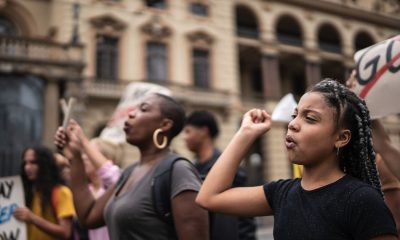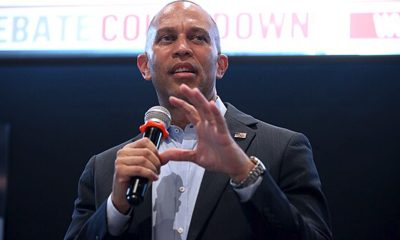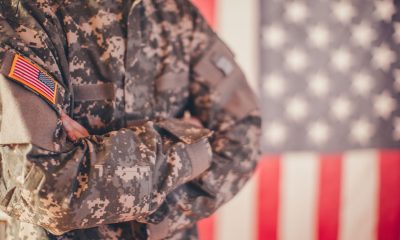Bay Area
Bay Area Native Tied to Serial Killings in Stockton, Oakland
Acting on a tip, local police and other law enforcement agencies began surveilling Wesley Brownlee, a Bay Area native. He was arrested while scouting for new victims. When he was taken into custody, Brownlee was dressed in black clothing and was carrying a pistol and a mask. “Our surveillance team followed this person while he was driving. We watched his patterns and determined early this morning he was on a mission to kill,” said Stockton Police Chief Stanley McFadden during a press conference. “He was out hunting.”

By Manny Otiko | California Black Media
Wesley Brownlee, a Bay Area native, is being held on murder charges by Stockton police. He is a suspect in a string of murders in Stockton and Oakland.
According to news reports, local police have long suspected a serial killer was operating in the area. The serial killer is suspected of being responsible for at least six murders. One of the victims was shot but survived.
Brownlee, who lives in Stockton, has a history of drug arrests. According to juvenile court records, Brownlee lost a brother to gun violence. After this incident, he showed signs of mental and emotional distress.
Acting on a tip, local police and other law enforcement agencies began surveilling Brownlee.
He was arrested while scouting for new victims. When he was taken into custody, Brownlee was dressed in black clothing and was carrying a pistol and a mask.
“Our surveillance team followed this person while he was driving. We watched his patterns and determined early this morning he was on a mission to kill,” said Stockton Police Chief Stanley McFadden during a press conference. “He was out hunting.”
California State Attorney General Rob Bonta praised the Stockton Police Department and other law officers for removing a dangerous criminal from the streets.
“I am grateful for the work of the Stockton Police Department and law enforcement agencies who lent their support to this investigation, including the California Department of Justice’s Bureau of Firearms and Bureau of Forensic Services,” Bonta said in a press release.
However, there seems to be no pattern to the murders. Four of the victims were Latino, and one was a white male. The lone survivor was a Black woman. Several victims were homeless.
According to FBI profilers, most serial killers are white males. But a few of them have been African American and people of color.
For example, Los Angeles-based serial killer Richard Ramirez, active from 1984-85 and known as the “Night Stalker,” was Hispanic. He was sentenced to death in 1989 and died in prison in 2013.
Lonnie David Franklin Jr., dubbed “the Grim Sleeper,” was African American. Franklin was responsible for at least 10 murders from 1984-2007. He was called the Grim Sleeper because he appeared to go dormant and then become active again at intervals during his killing spree, which lasted three decades.
Franklin mainly targeted women in the South-Central area of Los Angeles. Most of his victims were sex workers. Several local residents complained that police didn’t take the killing seriously. After being convicted and then sentenced to death in 2016, Franklin died in custody in 2020.
According to FBI records, Samuel Little, an African American, is considered the most prolific serial killer. He claimed responsibility for 93 murders, 50 confirmed by the FBI.
According to police records, Little operated in Los Angeles and parts of Los Angeles County at one point. But before dying in prison in 2020 at the age of 80, prosecutors planned to tie him to murders in at least 14 states. He was serving a life sentence.
Activism
OP-ED: AB 1349 Puts Corporate Power Over Community
Since Ticketmaster and Live Nation merged in 2010, ticket prices have jumped more than 150 percent. Activities that once fit a family’s budget now take significant disposable income that most working families simply don’t have. The problem is compounded by a system that has tilted access toward the wealthy and white-collar workers. If you have a fancy credit card, you get “presale access,” and if you work in an office instead of a warehouse, you might be able to wait in an online queue to buy a ticket. Access now means privilege.

By Bishop Joseph Simmons, Senior Pastor, Greater St. Paul Baptist Church, Oakland
As a pastor, I believe in the power that a sense of community can have on improving people’s lives. Live events are one of the few places where people from different backgrounds and ages can share the same space and experience – where construction workers sit next to lawyers at a concert, and teenagers enjoy a basketball game with their grandparents. Yet, over the past decade, I’ve witnessed these experiences – the concerts, games, and cultural events where we gather – become increasingly unaffordable, and it is a shame.
These moments of connection matter as they form part of the fabric that holds communities together. But that fabric is fraying because of Ticketmaster/Live Nation’s unchecked control over access to live events. Unfortunately, AB 1349 would only further entrench their corporate power over our spaces.
Since Ticketmaster and Live Nation merged in 2010, ticket prices have jumped more than 150 percent. Activities that once fit a family’s budget now take significant disposable income that most working families simply don’t have. The problem is compounded by a system that has tilted access toward the wealthy and white-collar workers. If you have a fancy credit card, you get “presale access,” and if you work in an office instead of a warehouse, you might be able to wait in an online queue to buy a ticket. Access now means privilege.
Power over live events is concentrated in a single corporate entity, and this regime operates without transparency or accountability – much like a dictator. Ticketmaster controls 80 percent of first-sale tickets and nearly a third of resale tickets, but they still want more. More power, more control for Ticketmaster means higher prices and less access for consumers. It’s the agenda they are pushing nationally, with the help of former Trump political operatives, who are quietly trying to undo the antitrust lawsuit launched against Ticketmaster/Live Nation under President Biden’s DOJ.
That’s why I’m deeply concerned about AB 1349 in its current form. Rather than reining in Ticketmaster’s power, the bill risks strengthening it, aligning with Trump. AB 1349 gives Ticketmaster the ability to control a consumer’s ticket forever by granting Ticketmaster’s regime new powers in state law to prevent consumers from reselling or giving away their tickets. It also creates new pathways for Ticketmaster to discriminate and retaliate against consumers who choose to shop around for the best service and fees on resale platforms that aren’t yet controlled by Ticketmaster. These provisions are anti-consumer and anti-democratic.
California has an opportunity to stand with consumers, to demand transparency, and to restore genuine competition in this industry. But that requires legislation developed with input from the community and faith leaders, not proposals backed by the very company causing the harm.
Will our laws reflect fairness, inclusion, and accountability? Or will we let corporate interests tighten their grip on spaces that should belong to everyone? I, for one, support the former and encourage the California Legislature to reject AB 1349 outright or amend it to remove any provisions that expand Ticketmaster’s control. I also urge community members to contact their representatives and advocate for accessible, inclusive live events for all Californians. Let’s work together to ensure these gathering spaces remain open and welcoming to everyone, regardless of income or background.
Activism
Oakland Post: Week of December 31, 2025 – January 6, 2026
The printed Weekly Edition of the Oakland Post: Week of – December 31, 2025 – January 6, 2026

To enlarge your view of this issue, use the slider, magnifying glass icon or full page icon in the lower right corner of the browser window.
Activism
Big God Ministry Gives Away Toys in Marin City
Pastor Hall also gave a message of encouragement to the crowd, thanking Jesus for the “best year of their lives.” He asked each of the children what they wanted to be when they grow up.

By Godfrey Lee
Big God Ministries, pastored by David Hall, gave toys to the children in Marin City on Monday, Dec. 15, on the lawn near the corner of Drake Avenue and Donahue Street.
Pastor Hall also gave a message of encouragement to the crowd, thanking Jesus for the “best year of their lives.” He asked each of the children what they wanted to be when they grew up.
Around 75 parents and children were there to receive the presents, which consisted mainly of Gideon Bibles, Cat in the Hat pillows, Barbie dolls, Tonka trucks, and Lego building sets.
A half dozen volunteers from the Big God Ministry, including Donnie Roary, helped to set up the tables for the toy giveaway. The worship music was sung by Ruby Friedman, Keri Carpenter, and Jake Monaghan, who also played the accordion.
Big God Ministries meets on Sundays at 10 a.m. at the Mill Valley Community Center, 180 Camino Alto, Mill Valley, CA Their phone number is (415) 797-2567.
-

 Activism4 weeks ago
Activism4 weeks agoDesmond Gumbs — Visionary Founder, Mentor, and Builder of Opportunity
-

 Activism4 weeks ago
Activism4 weeks agoFamilies Across the U.S. Are Facing an ‘Affordability Crisis,’ Says United Way Bay Area
-

 Alameda County4 weeks ago
Alameda County4 weeks agoOakland Council Expands Citywide Security Cameras Despite Major Opposition
-

 Alameda County4 weeks ago
Alameda County4 weeks agoBling It On: Holiday Lights Brighten Dark Nights All Around the Bay
-

 Activism4 weeks ago
Activism4 weeks agoBlack Arts Movement Business District Named New Cultural District in California
-

 Activism4 weeks ago
Activism4 weeks agoLu Lu’s House is Not Just Toying Around with the Community
-

 Activism4 weeks ago
Activism4 weeks agoOakland Post: Week of December 17 – 23, 2025
-

 Black History3 weeks ago
Black History3 weeks agoAlfred Cralle: Inventor of the Ice Cream Scoop



















































